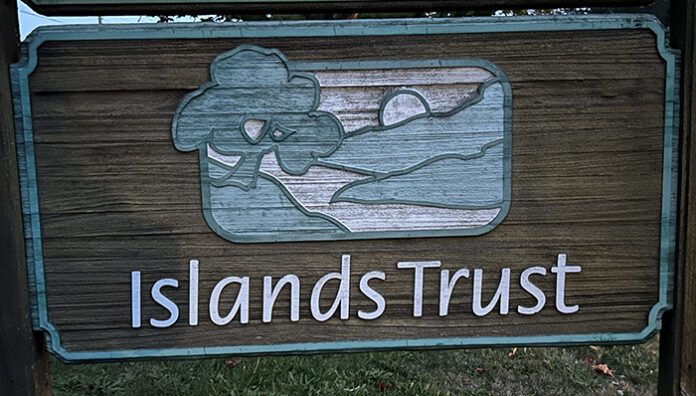As local officials continue a review of Islands Trust bylaw enforcement policy, trustees and staff are grappling with seemingly fundamental questions, including when to take action — and when to do nothing.
The land use authority’s current policy came under fire in 2023, as residents voiced concern over issues of transparency, fairness and heavy-handedness in how the Trust worked to gain compliance with its bylaws. Things came to a head after the provincial Ombudsperson’s office issued a list of recommendations last fall. In March of this year, trustees officially kicked off a review process with the goal of “restoring public confidence.”
That project sits, for the moment, with the Trust Council’s Regional Planning Committee (RPC).
“It’s our job to make sure the system supports fair, just and effective bylaw enforcement policies for all of the islands,” said Denman trustee Sam Borthwick, who chaired the RPC meeting Wednesday, Sept. 4. “I think blind adherence to guidelines is a hallmark of a system that’s too overwhelmed to show discretion.”
Local governments have generally wide discretion on whether, when and how to take enforcement action on their own bylaw contraventions — a discretion historically exercised often, if unevenly, in the Islands Trust area, usually due to community desires or simply because of limited resources.
But local governments can also, by design or otherwise, impose upon themselves a duty to enforce through the language in their own bylaw statutes. The Islands Trust’s current bylaw compliance and enforcement policy states investigations “may be commenced” in response to complaints, a wording that some trustees believed should imply a choice on whether to proceed. However, through legal review, it seems staff have found that “may” in that policy means “must” — and trustees struggled to agree.
“To me, ‘may’ is very specifically a word that allows you to exercise some discretion,” said Borthwick. “And I think it’s really important for us as an organization to be discretionary; one of the really wonderful things about the Trust is that because we are a smaller body, we have the capacity to look at things on a more bespoke basis.”
But “may” is often interpreted as “must” in legislation, particularly where the word confers an authority; both the Trust and the Capital Regional District (CRD) have regularly cited their obligation to respond to bylaw complaints. And, according to bylaw compliance and enforcement manager Warren Dingman, it is the local Trust committees (LTCs), not staff, who are the actual authority.
“These are your bylaws,” said Dingman. “I can’t say I’m not going to investigate a complaint against your bylaws without proper direction and policies.”
Moving forward, he said, if Trust Council or LTCs want to add discretion for staff, they need to do so explicitly.
“We need it in the policies, and we need it in writing,” said Dingman. “I can’t just say I have the authority to do A, B and C when in fact no such legal authority exists.”
Trust Council lacks not just clear policies on discretion, according to a staff report, but about several other issues that have been points of community contention — such as what sort of advance notice needs to be given before inspecting someone’s property, what defines a “minor” contravention and when complaints are frivolous or lack substance.
“For whatever reason,” said Dingman, “unlike every other jurisdiction in B.C. that has a bylaw enforcement policy, the Islands Trust never developed a policy to deal with vexatious, frivolous or repeat complaints. It just didn’t exist.”
That near-automatic response — with complaints triggering investigations — has amplified neighbour disagreements and strained budgets on several islands, according to staff. A high number of complaints about possible bylaw infractions in Ganges Harbour last year put bylaw enforcement’s transportation budget over the top with water taxi costs there, and a whirlwind of complaints in the first three months of 2024 on tiny Mudge Island caused enough turmoil to prompt rare correspondence to the RPC from the Mudge Island Community Association.
In earlier years, according to the association, there had been as few as six complaints on Mudge in a year, who wrote there had been “58 complaint emails (with a total of 132 separate complaints) between January and April 2024,” according to correspondence.
In an email to the Driftwood, Dingman clarified his count for new Mudge Island files in 2024 was 45, and that there may have been 132 open files for the Gabriola Local Trust Area as a whole at some point this year, but they were not all on Mudge Island.
Even once it had seemingly been determined that just a few individuals had made all or most of the complaints, according to Gabriola Island trustee Tobi Elliott, every complaint had a file opened.
“And that led to more community members feeling targeted,” said Elliott. “I’m talking about elderly people who’ve lived in an unpermitted house for 50 years, and suddenly they’re like, ‘Do I have to move?’”
Denman Island trustee David Graham expressed relief the system was being reviewed, saying any island could find itself facing such a “test” of the bylaw system.
“They could have driven around [Denman Island] and probably found 100 infractions and sent that along to the bylaw enforcement, and they would’ve been swamped,” said Graham. “Can you imagine the chaos that would ensue if someone on every island decided to do the same thing?”
This article has been updated from an earlier version to include clarification on complaint numbers.

